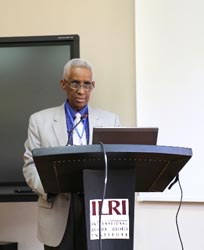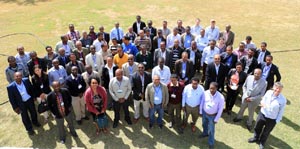N2Africa-Ethiopia held its second annual planning and the Public-Private Partnership Validation workshop on 21-23, January 2015 with about 90 participants from the NARS, private partners, ILRI, CG centers, representatives of farmers’ organizations and N2Africa leadership staff from Nairobi, Ibadan and Wageningen.
Alan Duncan, ILRI Principal Livestock Scientist and N2Africa Project Management Member, made a warm welcome speech highlighting the fact that N2Africa is moving beyond agronomy to other key project components including partnership development and gender.
|
The workshop was officially opened by the Honorable Guest, H.E. Prof. Tekalign Mamo, State Minister’s Advisor for agriculture and Winner of "2014 Yara Award". H.E. has emphasized the global/regional focus to soil fertility improvement, in general, and the current effort of Ethiopian government in conducting soil survey and fertilizer blend development, in particular, as the country is losing millions of dollars due to soil degradation. The effort of N2Africa project in promoting biological nitrogen fixation and legume production technology at the different parts of the country was appreciated and marked as a potential support to the Ethiopian government for which joining hands as partners and aligning efforts was boldly indicated for ensuring sustainability. Figure 1. H.E. Prof. Tekalign Mamo, State Minister’s Advisor for agriculture and Winner of "2014 Yara Award" |
 |
In this event, Siboniso (Boni) Moyo, ILRI’s Director General’s Representative in Ethiopia, has pin pointed to the potential contribution of engaging the public and private partners in research for development work and the effort that is being made by the project to this regard through partnership development.
An overview of N2Africa project in general and specific to Ethiopia was presented by Endalkachew Woldemeskel, the N2Africa country coordinator for Ethiopia. In the presentation, he indicated that the agronomic results of the bridging year and 2014 preliminary results showed clear yield differences on target legumes due to promotion of N2Africa legumes technology. The progresses on other project activities such as the input supply chain, grain market access and gender was also emphasized.
With a clear overview of the dissemination and sustainability strategy by Edward Baars, Senior Business Development Officer for N2Africa project, the Public-Private Partnership (PPP) strategic framework for Ethiopia was presented by Yared Sertse from Shayashone Trading PLC. In its design, the PPP has focused on four major pillars of the project: the capacity building pillar, input demand and information, dissemination and marketing. The partnership models were appreciated with few concerns including the coordination and operationalization of the PPPs at different project implementation levels.
Results of 2014 project activities were presented by the respective NARS partners with a brief individual presentations followed by detail explanations following ‘a market place or bus stop approached’ with an excellent facilitation by Peter Ballantine, Head of ILRI’s communication. Dr. Theresa Ampadu-Boakye (The Monitoring and Evaluation Specialist), Joost van Heerwaarden (the Data Manager) and Eskender Beza (a PhD fellow on ‘validation of digital data collection’) made a presentation on the data capturing processes and learning as a team. Across the presentations, it was observed that application of inoculants and fertilizer improved crop performance as compared to the control treatments. Furthermore, inoculation resulted in better diseases resistance in legume crops. However, investigations on seed dressing fungicide versus inoculants is needed to safeguard germinating seeds after planning. In some target locations, faba bean was indicated to be less responsive to inoculation, which may be related to its promiscuous nature. Key challenges discussed include moisture stress, severe faba bean disease, low farmers awareness on inoculations, faba bean seed shortage in north, shortage of vehicle, lack of adequate trainings for researchers, and lack of frequent field follow-up from Woreda Bureau of Agriculture.
| During the second and third days of the workshop, partners worked out entirely on 2015 planning sessions as groups. The planning was made based on project Result Framework where partners were initially subdivided in to random groups of five to work out and come up with list of activities for each of the specific project objectives. Finally, partners rejoined to their specific institutions to finalize the planning process for the five project objectives. The other dissemination partners, like the NGOs and private, also joined the respective NARS partners as depicted in the PPP framework for the planning and possible synergies. |
Figure 2. Partial view of ILRI-N2Africa Annual Planning & the Public-Private Partnership (PPP) Validation Workshop participants |
During the second and third days of the workshop, partners worked out entirely on 2015 planning sessions as groups. The planning was made based on project Result Framework where partners were initially subdivided in to random groups of five to work out and come up with list of activities for each of the specific project objectives. Finally, partners rejoined to their specific institutions to finalize the planning process for the five project objectives. The other dissemination partners, like the NGOs and private, also joined the respective NARS partners as depicted in the PPP framework for the planning and possible synergies.
Fred Kanampiu, N2Africa project manager, clearly indicated the importance of clear understanding in project implementation, coordination of partners, engagements with project leadership staff to gain critical inputs. He also indicated that issues of data quality, sustainability, transferring research outputs to outcomes are important aspects while creating business opportunities targeting improvements of smallholder farmer’s livelihoods is the main goal of the project.
Finally, Tafa Jobie, Director for Oromia Agricultural Research Institute Crop Research, appreciated the effort of the project in addressing more agro ecological zones, engaging more partners, acknowledged the project progress so far and officially closed the workshop.
Synthesized by N2Africa-Ethiopia National Team (Endalkachew, Tamiru and Birhan)

